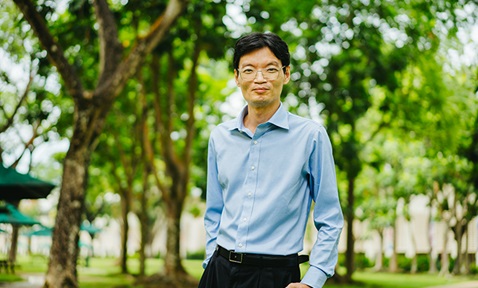Singapore improves in OECD ranking of adult skills, but atrophy in literacy a concern
SINGAPORE – The Republic has notched improvements in a global test of adult skills, though a sizeable skills gap remains between young adults and older workers here.
Results of the Programme for the International Assessment of Adult Competencies (PIAAC), released on Dec 10, showed that Singapore was the most improved country for numeracy alongside Finland, rising from 25th out of 39 countries in the previous study to 10th out of 31 countries in the most recent one.
The study, which assesses the proficiency of adults in numeracy, literacy and problem-solving skills, also saw Singapore climb the ranks in literacy proficiency of its adults, from 28th to 18th place.
Meanwhile, adults here scored at the average for adaptive problem-solving across the 31 participating countries.
But while younger people here aged 16 to 34 continued to score better than the Organisation for Economic Cooperation and Development (OECD) average across all three categories, the study flagged a significant decline in literacy after the age of 35.
Conducted by the OECD, the study surveyed more than 5,000 Singapore citizens and permanent residents aged between 16 and 65 from 2022 to 2023. Singapore also participated in the study’s first cycle, which was conducted from 2014 to 2015.
Finland took the top spot for both literacy and numeracy in the latest study. Japan and Finland both scored the highest for adaptive problem-solving.
Singapore’s middle-of-the-table scores for adult skills stand in contrast to its top performance in the OECD’s Programme for International Student Assessment (Pisa), which tests the critical-thinking skills of 15-year-olds. Students here took first place for mathematics, science and reading in the latest Pisa study.
The OECD observed that when it compared adults born in the same years across different cycles, most countries had substantial age-related skill losses after the age of 35.
In Singapore’s case, this was evident in literacy skills but not in numeracy. For instance, adults who were in the 35 to 44 age bracket in the latest study scored 21 points lower in literacy than in the previous edition, when they were in the 27 to 36 age range.
Those who were between 55 and 65 years old in the latest study also scored 16 points lower in literacy than their cohort did in the earlier study, which the OECD called “a significant decline”.
Nanyang Technological University (NTU) Professor Annabel Chen said this finding may be due to the Republic’s unique multilingual society and workplace context.
While English is the official working language, it may not be the primary language used in some environments, said Prof Chen, who is director of NTU’s Centre for Research and Development in Learning.
“This could impact the retention of English literacy, which is the focus of the PIAAC survey,” she said, adding that workplace shifts towards automation and technology might reduce the regular use of traditional literacy skills, especially for mid-career workers.
SkillsFuture Singapore (SSG) made a similar observation, noting that skills may decline over time after people leave school, as their use at work and in daily life may be less demanding.
The earlier onset of decline in literacy proficiency in Singapore was also seen in countries such as Hungary, Lithuania, Poland and South Korea, said SSG.
Associate Professor of English language and literature Loh Chin Ee noted that while Singapore’s adult literacy rate grew from 52.6 per cent in 1960 to 97.6 per cent in 2021, the literacy gap is likely to be wider for older adults, and it may be harder for them to keep pace as they age.
The latest OECD findings suggest that Singapore’s education system is doing well to equip today’s students with literacy skills for information processing, but there is a need to maintain literacy levels as people age, said Prof Loh, who is deputy head of research at the National Institute of Education.
“How well our students are able to handle new information and new forms of information is a key literacy skill. Adult education to facilitate lifelong learning, whether through sustained education or more ‘just-in-time’ efforts, will be necessary,” she added.
The adult skills study comprised an in-person interview conducted in participants’ homes and a self-completed assessment, and is representative of the 2.8 million people aged between 16 and 65 who resided in Singapore at the time of data collection.
Participants had to complete the assessment on tablets, a change from the previous edition when they could opt for a paper-based test.
The online assessment tested how they applied literacy, numeracy and adaptive problem-solving skills across a range of situations adults might experience in their daily lives.
Mr Tan Kok Yam, chief executive of SSG and chairman of the Institute for Adult Learning Council, said companies, institutions and the Government need to work together to advance the SkillsFuture movement and help mid-career workers benefit from further education and training.
This is in addition to maintaining Singaporeans’ capacity to learn after they leave school, and for the workforce to stay relevant amid technological change.
Mr Tan added: “The results give us confidence that our workforce has raised its collective capacity to upskill and adapt. At the same time, there is room to do even better.”
Read the original article here.
Source: The Straits Times © SPH Media Limited. Permission required for reproduction.




.tmb-listing.jpg?Culture=en&sfvrsn=70a5113b_1)
.tmb-listing.jpg?Culture=en&sfvrsn=1a71f9dd_1)
.tmb-listing.jpg?Culture=en&sfvrsn=6330dcae_1)
